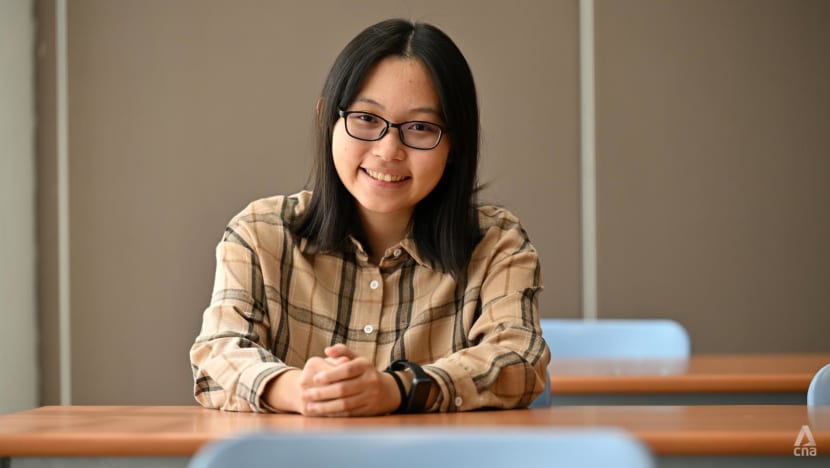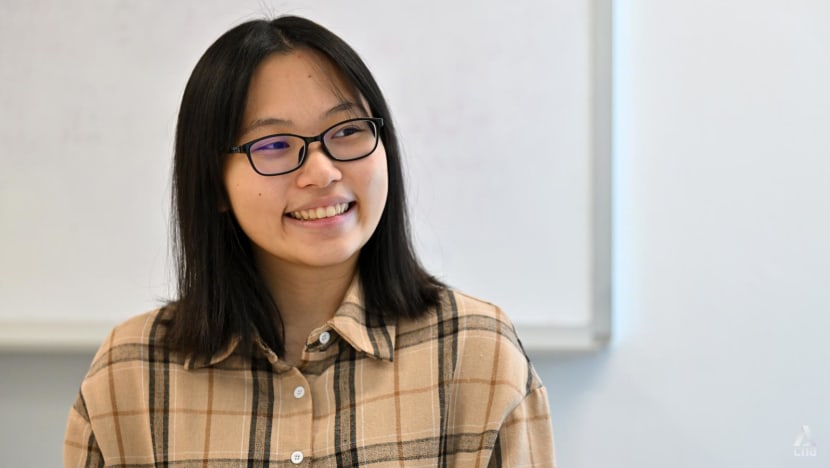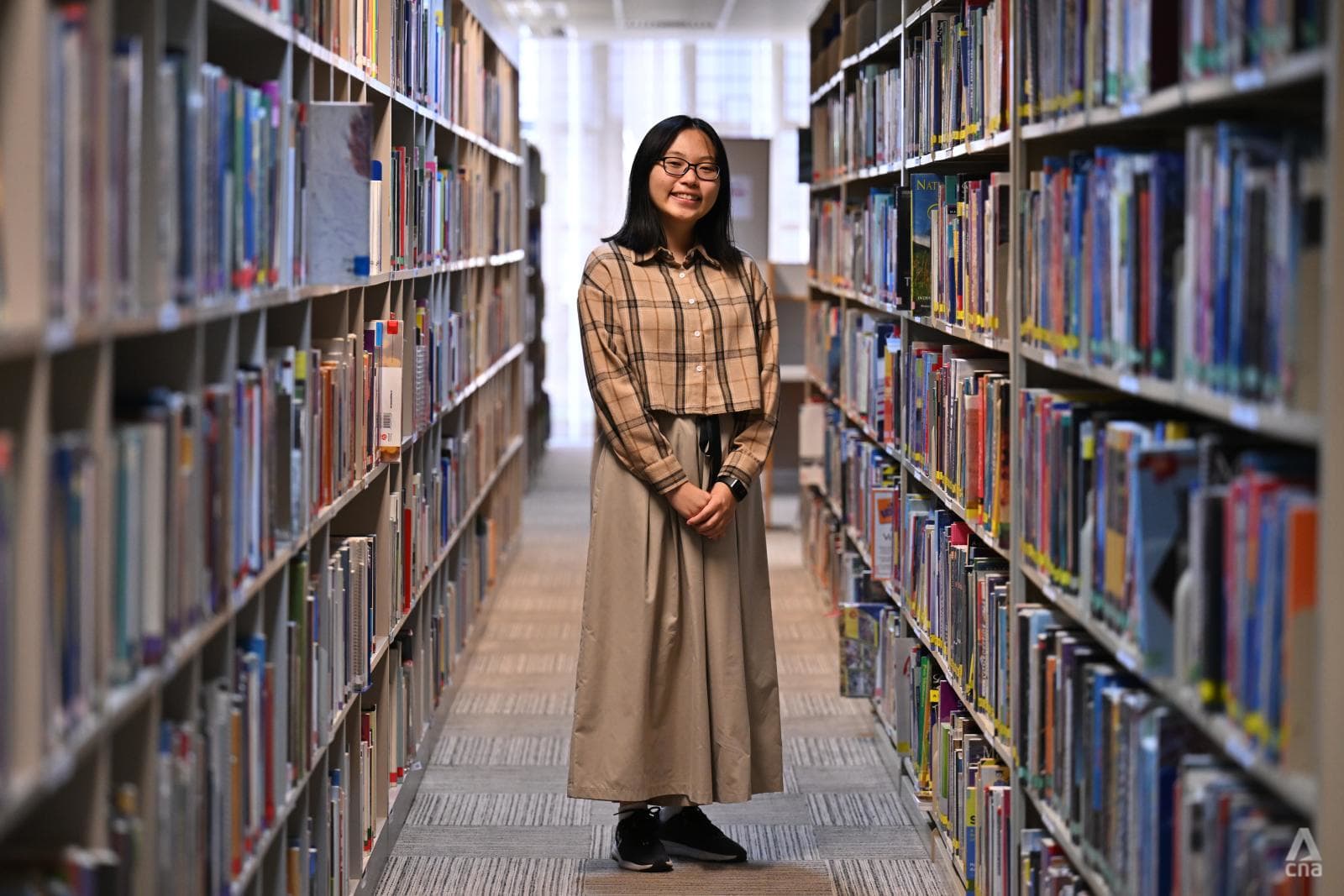This JC student was a high achiever, until she suffered recurrent memory loss
When Fiona Yek started experiencing sudden memory loss during her first year in junior college, the conscientious student first struggled to accept her plummeting results – then regain her footing in time for A-Levels.

Fiona Yek, a student of Jurong Pioneer Junior College, in a classroom at the junior college a day before the release of her A-Level results. (Photo: CNA/Jeremy Long)

This audio is generated by an AI tool.
SINGAPORE: Junior college (JC) student Fiona Yek finds organic chemistry fun because she loves understanding how things are formed.
The 20-year-old would know, for instance, how diamonds are formed under pressure. And that’s not just because she aspires to become a chemistry teacher.
Ms Yek from Jurong Pioneer JC was a high achiever who scored As and Bs consistently. Getting good grades was her “whole thing” – until it wasn't.
One day in her first JC year, she was struck by sudden memory loss on the way to school. The episode repeated itself over the next two years, affecting her once-stellar track record and emotional well-being.
The teenager whose report card defined her was forced to re-examine her priorities.
“It was a jarring change and it messed me up. Studying was the only thing that I thought I was good at,” she told CNA on Thursday (Feb 22), a day before her GCSE A-Level examination results were released.
“Obviously that affected me emotionally. In school, I would also be pretty gloomy. I couldn’t focus in class because I was overly worried about how I couldn’t remember. It was a continuous cycle.”

SUDDEN MEMORY LOSS, RECURRENT EPISODES
The fateful day started off as a normal day.
Ms Yek was on the bus when she suddenly felt like she had been “teleported” into new surroundings “with no prior knowledge”. She tried to convince herself the disorienting experience was due to stress or a lack of sleep.
But that line of reasoning “fell apart” once she arrived in class.
“I couldn’t recognise some faces and that messed me up on the inside. Because I know they are people I’m supposed to know; they’re my classmates. They looked familiar but I couldn’t put a name to (their faces) or associate anything with them. That’s when I broke down,” she recalled.
“Because in my brain, I was like, how can you forget how someone looks, no matter how tired you are?”
Ms Yek told her form teacher, who prioritised trying to ground her and ensure she was emotionally well.
Her family, on the other hand, initially had difficulty understanding what she was going through. But they did their best to let her know they were with her, she said.
“I wasn’t really expecting everyone to believe me because it’s such an out-of-body experience. And it didn’t really matter whether people believed me. It was more of how I could deal with it.”
Even doctors couldn’t figure out what was the problem, she added, noting that she still attends regular checkups.
Ms Yek reasoned that the subsequent episodes, which happened “pretty frequently”, were probably caused by the stress she already felt that further exacerbated her condition. By then, the memory lapses no longer just affected her recognition of classmates.
She studied H2 Chemistry, Physics and Mathematics, as well as H1 Literature and General Paper.
“I couldn’t properly recall the content in JC. It was content where you needed certain prior knowledge to answer the question. Sometimes in class, I wouldn’t even know what subject the teacher was teaching. It was like I just spawned in there, like in a video game,” she said.
The episodes often blindsided her when she was trying to revise or do homework, she added.
“I’m the type of person who writes a lot of notes, and you would normally have a vague recollection that you wrote something. But when I opened (my notes), it’s like I had no memory of it even though it’s my handwriting.”
FINDING RESPITE IN A GAP YEAR
Despite her frequent struggles, Ms Yek admitted she was “somewhat still desperate” to ace her promotional exams at the end of her first year.
While she didn’t score well, she managed to get promoted, her overall score boosted by her previous grades.
“I was somewhat resigned already. I knew I wouldn’t do well, but it was still jarring to see my originally good grades just drop,” she said.
Ms Yek also realised then how her struggles affected her family. She had “constant breakdowns”, and often stayed up until 12am or 1am to revise even when she didn’t have exams.
“I was originally a very independent kid, and that’s why my parents would normally leave me to do things on my own. But during that period, they started to interact with me more and that’s when I realised I was worrying them,” she recalled.
“I needed to do something to change (my) ways. I’m a very family-oriented person and I needed to not worry them as much.”
That realisation cemented her decision to take a gap year. Any concern she would fall behind her peers was overshadowed by her desire to find her footing again and stop worrying her family.

During her gap year, Ms Yek found her way back to art – an old hobby that she had abandoned when she entered JC.
“I told myself I didn’t have time for something like that. I think I was giving myself excuses. But during my gap year, art was something that helped me a lot,” she said.
“It sounds a bit cheesy but it was like a different world. I could do whatever I want; I made my art for myself. There were no expectations. It was just a way to express myself.”
On bad days, she put pen to paper to vent her emotions. On a good day, she drew things that she found funny. In time, art became a “place of respite” for her again.
Pulling out a drawing done during her gap year, Ms Yek said she created it when she had already made up her mind to return to school.
“So from the drawing, you can see there’s a grey part that’s slowly fading away. And the grey part was, you can say, the past me who wasn’t really coping well,” she shared.
“The environment is very vibrant – and the girl is slowly transitioning into that vibrant colour as well.”
EMBRACING A “NEW REALITY”
This, too, mirrored the change in Ms Yek.
When she returned to her second year in JC, she was “mentally a lot better”, she said, attributing this change partly to art. “I learnt how to manage and express myself better, even though there were times where I (still) had episodes of memory loss.”
It wasn’t that her memory lapses were less severe, she clarified. She was simply better at dealing with the struggle.
“Throughout the gap year, it was just me accepting that this is my new reality, and I just need to integrate it into how I would approach people or how I would do things.”

Ms Yek was “more open to trying new things” upon returning to school. No longer could she solely rely on rote memorisation to study, even as she practised the same questions repeatedly.
What helped the most, she realised, was being allowed to record her teachers during lessons. As an auditory learner, she found it helpful to have a recording she could replay anytime.
She was also more honest in her personal interactions, not feeling the pressure to keep up a front anymore.
When the memory lapses first happened, she would “pretend” she recognised a person and hold a whole conversation with them, all without remembering who they were, she recalled in amusement.
“But at the start of J2, I just told the class, ‘Hi, I’m very forgetful. If I don’t recognise you, don’t hold it against me. Just a heads up.’ And I’m glad I did that, because their attitudes didn’t change,” she said.
“During a conversation, if I forgot what I was saying or I didn’t know what they were saying, they would just repeat it for me. I don’t know how many times they did that but I’m very grateful.”
Life was “more liberating” when she didn’t have to hide who she was.
A day before her A-Level results were released, Ms Yek seemed somewhat accepting of whatever fate had in store.
“Whatever happens, happens. I do have plans but if it doesn’t go well, I won’t be disheartened … I mean, okay, maybe I will be a bit,” she said. “But I have to find some other way like how I did in J1.”
The "other way" ended up forming who she is now. “This whole experience helped build my character," she admitted.
"I was a bit narrow-minded last time, like grades are everything; if I don’t do well, I’m a failure. But throughout this journey, I realised that people around me matter quite a bit more.”
When the 20-year-old received her A-Level results on Friday, she ran to her family with tears of joy and relief. Printed on her result slip, among her "better than expected" grades, was an A for chemistry.
















